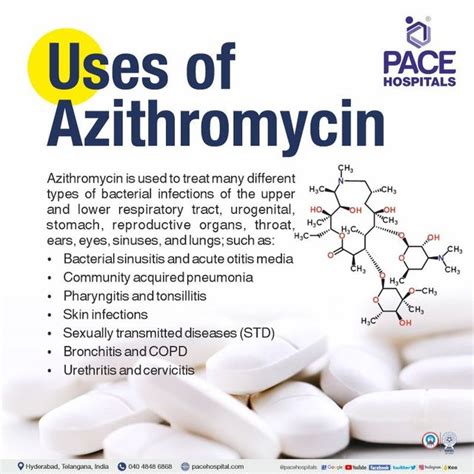Intro
Discover 5 essential uses of Azithromycin 500mg, an antibiotic treating bacterial infections, respiratory issues, and STDs, with applications in bronchitis, pneumonia, and skin infections, offering effective relief and prevention.
The importance of antibiotics in modern medicine cannot be overstated. Among the various antibiotics available, Azithromycin 500mg has emerged as a widely prescribed and effective treatment for a range of bacterial infections. This medication belongs to the class of macrolide antibiotics, which work by inhibiting the growth of bacteria. The versatility of Azithromycin 500mg lies in its broad spectrum of activity, making it a valuable option for treating various infections. Its effectiveness, combined with a relatively favorable side effect profile, has contributed to its popularity among healthcare providers and patients alike.
Azithromycin 500mg is particularly noted for its convenience, as it often requires a shorter treatment course compared to other antibiotics. This aspect is crucial in enhancing patient compliance, as shorter treatment durations can lead to better adherence to the prescribed regimen. Furthermore, the medication's ability to penetrate into tissues effectively ensures that it reaches the site of infection, thereby enhancing its efficacy. The drug's pharmacokinetic properties, including its long half-life, allow for once-daily dosing, which is a significant advantage in terms of convenience and compliance.
The application of Azithromycin 500mg extends across a variety of bacterial infections, underscoring its broad therapeutic utility. From respiratory tract infections to skin and soft tissue infections, this antibiotic has proven to be a reliable choice. Its use in treating sexually transmitted infections also highlights its versatility. Understanding the full range of applications and benefits of Azithromycin 500mg is essential for both healthcare professionals and patients, as it can guide informed decision-making regarding its use.
Introduction to Azithromycin 500mg

Azithromycin 500mg is a macrolide antibiotic that has been widely used for the treatment of bacterial infections. Its mechanism of action involves the inhibition of protein synthesis in bacteria, which leads to the cessation of bacterial growth. This medication is available in various forms, including tablets and oral suspensions, making it accessible for a wide range of patients, including children and adults.
How Azithromycin 500mg Works
The working mechanism of Azithromycin 500mg is based on its ability to bind to the bacterial ribosome, specifically to the 50S subunit. This binding inhibits the translocation step of protein synthesis, which is essential for the growth and replication of bacteria. By preventing protein synthesis, Azithromycin 500mg exerts its bacteriostatic effect, which means it inhibits the growth of bacteria rather than killing them outright. This action is effective against a broad spectrum of Gram-positive and some Gram-negative bacteria.Uses of Azithromycin 500mg

Azithromycin 500mg is indicated for the treatment of various bacterial infections, including:
- Acute bacterial exacerbations of chronic bronchitis
- Acute bacterial sinusitis
- Community-acquired pneumonia
- Pharyngitis/tonsillitis
- Skin and soft tissue infections
- Genital ulcer disease (chancroid)
- Nongonococcal urethritis and cervicitis
Benefits of Azithromycin 500mg
The benefits of using Azithromycin 500mg include its high efficacy rates, convenience of once-daily dosing, and a relatively low incidence of side effects compared to other antibiotics. Additionally, its broad spectrum of activity makes it a valuable option for empiric treatment when the causative pathogen has not been identified.Side Effects and Precautions

While Azithromycin 500mg is generally well-tolerated, it can cause side effects such as gastrointestinal disturbances (diarrhea, nausea, abdominal pain), headache, and dizziness. Serious side effects, although rare, can include allergic reactions, liver enzyme abnormalities, and QT interval prolongation, which may lead to serious cardiac arrhythmias.
Contraindications and Interactions
Azithromycin 500mg is contraindicated in patients with known hypersensitivity to azithromycin, erythromycin, or any macrolide or ketolide antibiotic. It can interact with various medications, including antacids, digoxin, and warfarin, among others, which may necessitate dose adjustments or close monitoring.Dosage and Administration

The dosage of Azithromycin 500mg varies depending on the type of infection being treated. For most infections, the recommended dose is 500mg once daily for 3 to 5 days, or as prescribed by the healthcare provider. It is essential to complete the full treatment course, even if symptoms improve before finishing the medication, to ensure the infection is fully cleared.
Special Considerations
In patients with renal impairment, no dose adjustment is necessary. However, for patients with severe hepatic impairment, caution is advised, and the medication should be used only when the benefits outweigh the risks.Conclusion and Future Perspectives

In conclusion, Azithromycin 500mg represents a valuable addition to the arsenal of antibiotics available for treating bacterial infections. Its broad spectrum of activity, convenience of use, and favorable side effect profile make it a preferred choice for many healthcare providers. As antibiotic resistance continues to pose a significant challenge, the responsible use of Azithromycin 500mg, along with other antibiotics, is crucial to preserve their efficacy for future generations.
Final Thoughts
The importance of antibiotics like Azithromycin 500mg cannot be overstated. As research continues to uncover new aspects of bacterial resistance and novel therapeutic targets, the role of Azithromycin 500mg and other macrolide antibiotics will likely evolve. For now, it remains a critical tool in the fight against bacterial infections, offering hope and effective treatment to countless individuals worldwide.What is Azithromycin 500mg used for?
+Azithromycin 500mg is used for the treatment of various bacterial infections, including respiratory tract infections, skin and soft tissue infections, and sexually transmitted infections.
How does Azithromycin 500mg work?
+Azithromycin 500mg works by inhibiting protein synthesis in bacteria, which leads to the cessation of bacterial growth.
What are the common side effects of Azithromycin 500mg?
+Common side effects of Azithromycin 500mg include gastrointestinal disturbances, headache, and dizziness. Serious side effects, although rare, can include allergic reactions and liver enzyme abnormalities.
We invite our readers to share their thoughts and experiences with Azithromycin 500mg, as well as any questions they might have regarding its use and applications. Your engagement and feedback are invaluable in helping us provide the most accurate and helpful information possible. Feel free to comment below or share this article with others who might benefit from the information provided.
